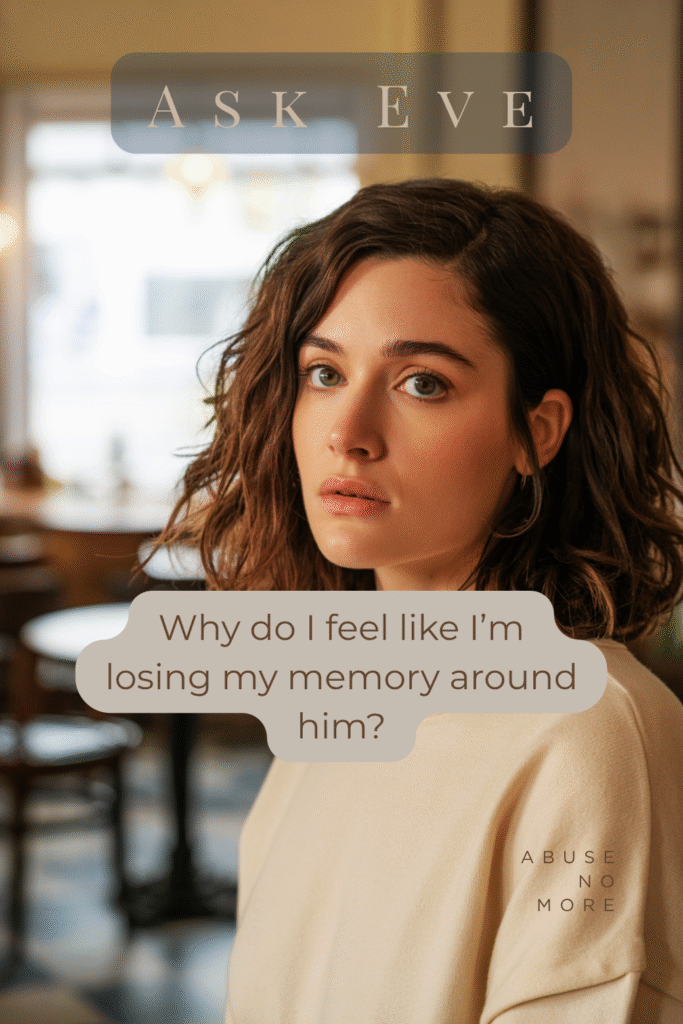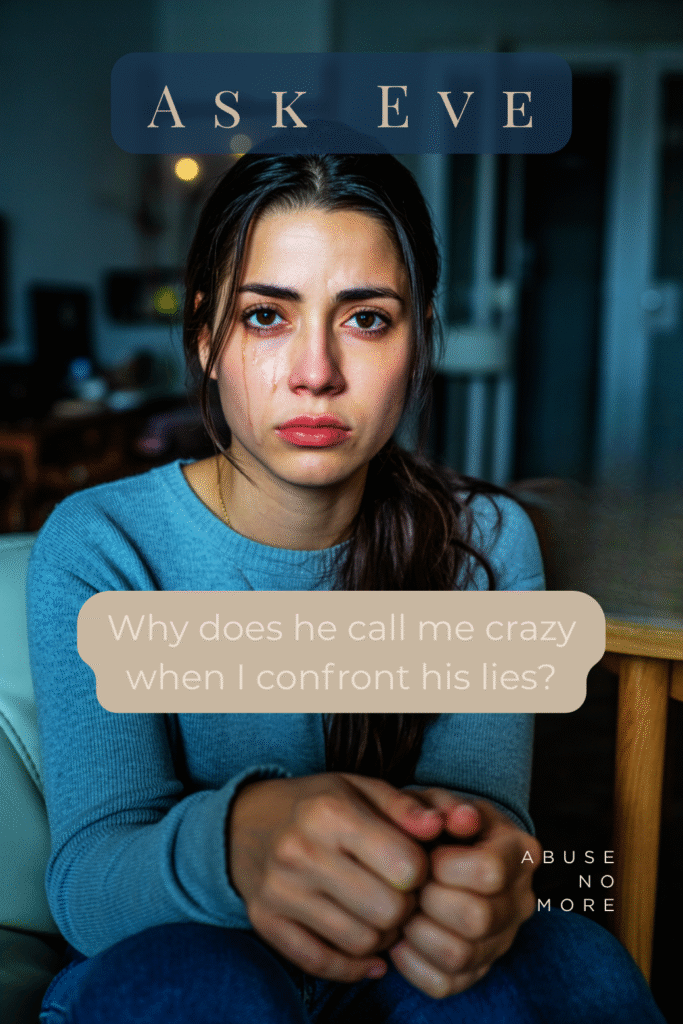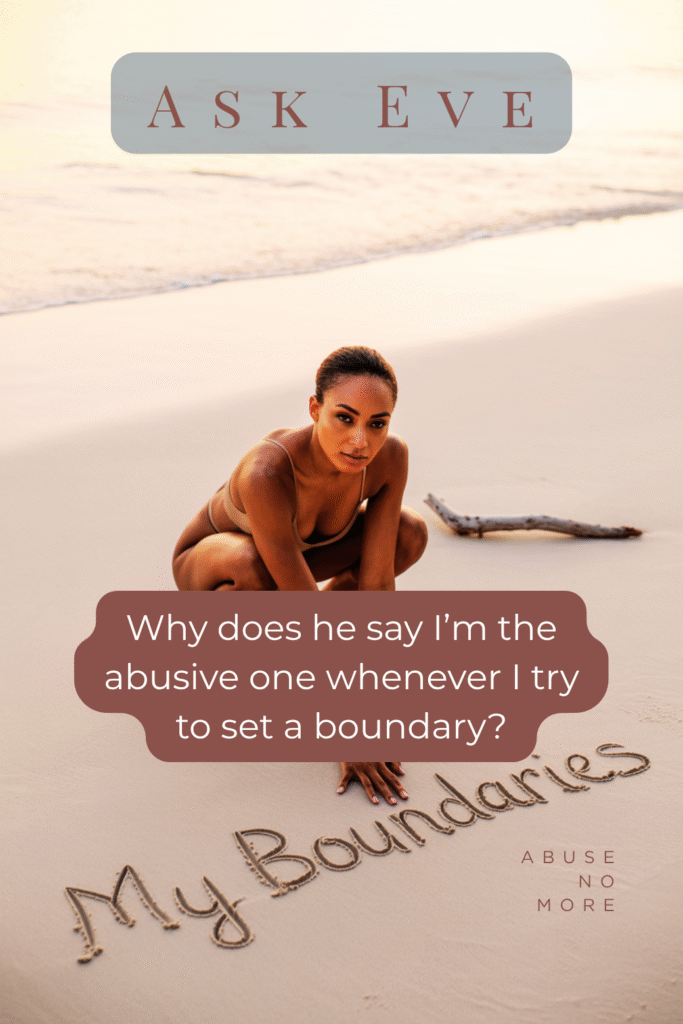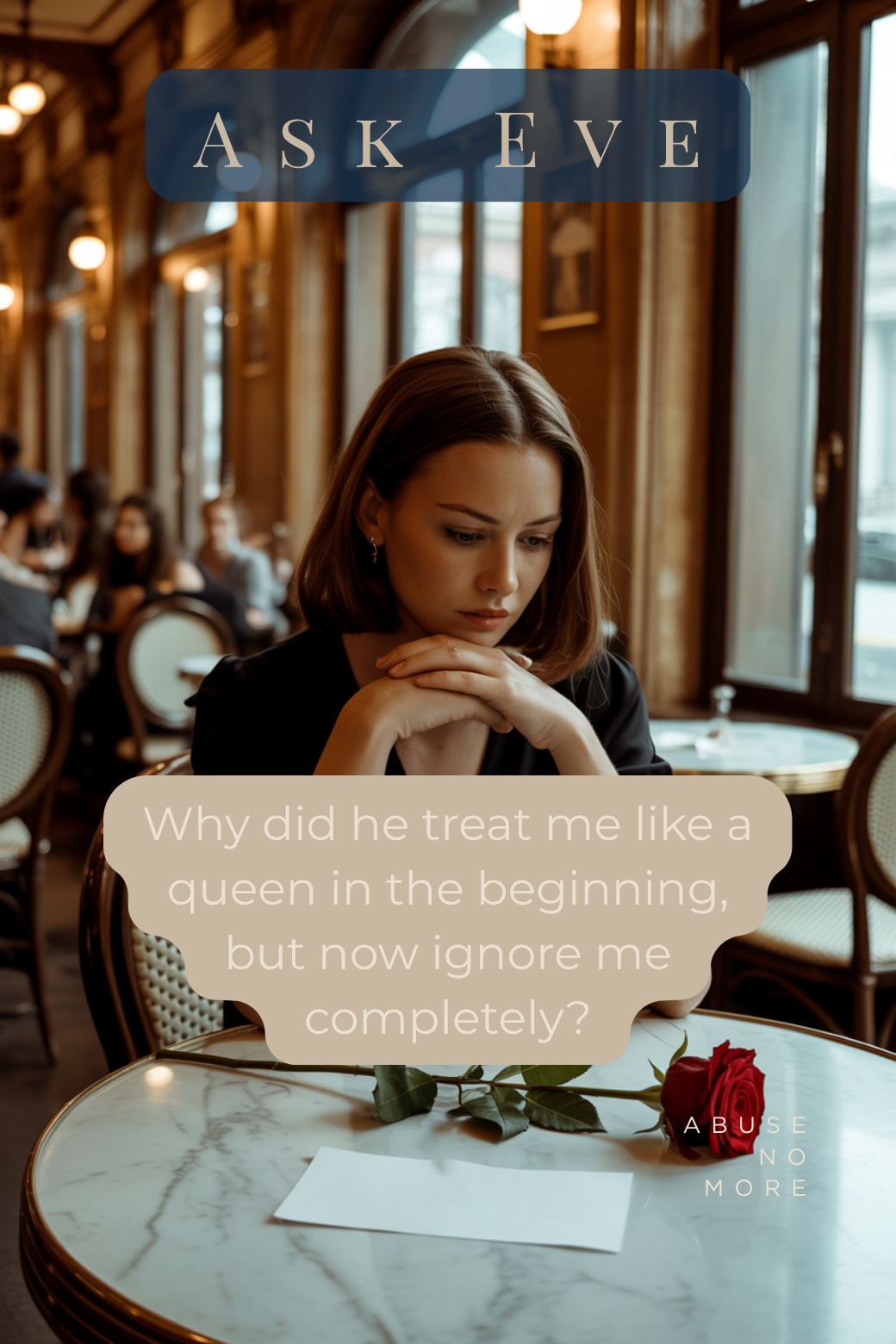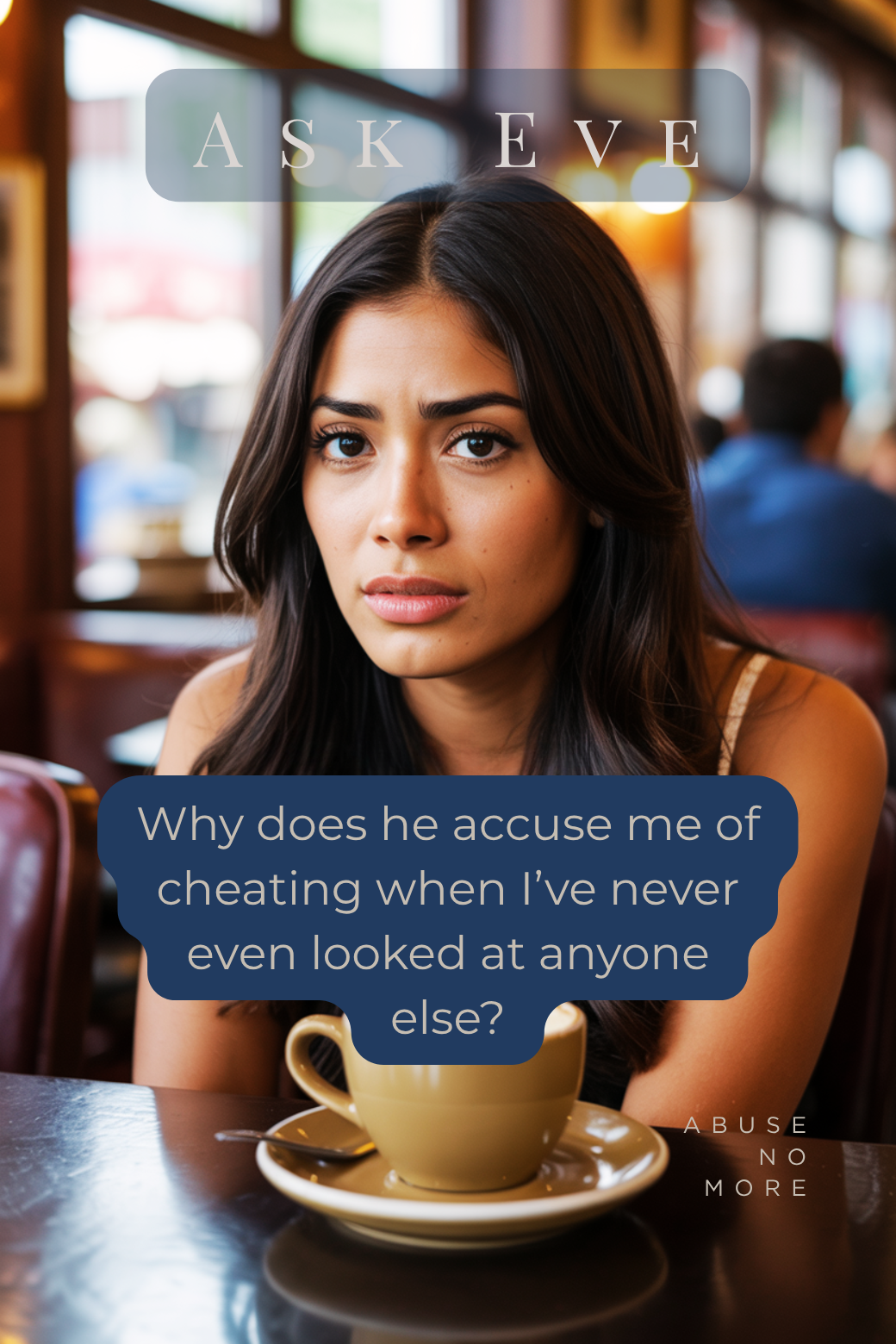Now Reading: “Why do I feel lonelier with him than when I’m by myself?”
- 01
“Why do I feel lonelier with him than when I’m by myself?”
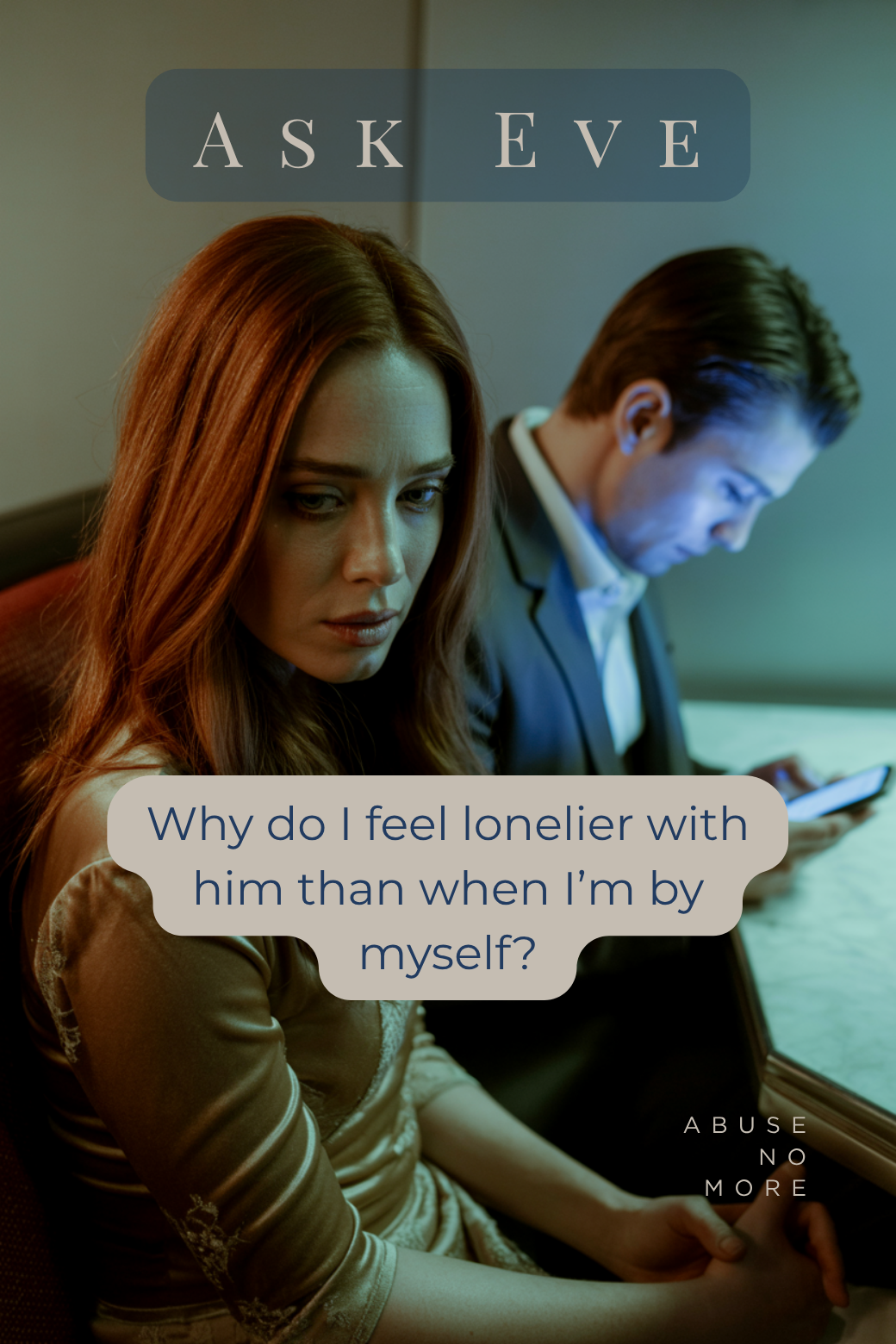
“Why do I feel lonelier with him than when I’m by myself?”
Why Do I Feel Lonelier With Him Than When I’m By Myself?
An Ask Eve™ Survival Guide to Emotional Abandonment in Narcissistic Relationships
💔 The Question No One Asks Out Loud
You’re lying next to him, but it feels like you’re a thousand miles apart.
You try to talk—he grunts, scrolls, walks away.
You cry—he sighs or laughs or tells you to “calm down.”
He’s right there… but emotionally, you might as well be screaming into a canyon. And here’s the kicker—you’re not just hurting, you’re blaming yourself for hurting.
“Maybe I’m too needy.”
“Maybe I’m just sensitive.”
“Maybe this is just what long-term love feels like…?”
No. Let’s call it what it is:
Emotional abandonment inside an active relationship.
And it hurts more than being alone—because it pretends to be love.
🔍 What Is Emotional Abandonment?
Emotional abandonment isn’t about someone physically leaving. It’s about them checking out while staying close enough to pretend they haven’t.
In narcissistic relationships, this form of disconnection is often intentional. It’s not neglect—it’s strategy.
Your partner may:
- Ignore emotional cues
- Dismiss your feelings as “drama” or “overreacting”
- Withdraw affection the moment you need support
- Respond to tears with silence or criticism
And over time, you begin to internalize a twisted message:
“My feelings don’t matter. Maybe I don’t matter.”
This creates what we call emotional captivity: you’re stuck in a relationship that drains you, but you don’t even feel allowed to name the wound.
🚩 7 Signs You’re Emotionally Abandoned (But Still Physically Together)
Let’s break this down clearly, because the gaslighting gets loud.
1. You feel safer alone than with them
When you’re by yourself, you feel relief. That’s not normal in a loving relationship—it’s a nervous system reaction to chronic emotional stress.
2. You’re constantly second-guessing your emotional needs
You’ve stopped asking for connection, affection, or support—because experience has taught you that your needs lead to punishment, not presence.
3. You perform emotional labor alone
You’re doing all the communicating, all the explaining, all the repairing—while they act like nothing happened.
4. Affection is conditional
They’re warm when they want something. Cold when you need something. Connection becomes a reward for obedience, not a shared bond.
5. You feel like a burden
You hesitate to speak up. You apologize for asking for the bare minimum. You walk on emotional eggshells daily.
6. They react to your pain with annoyance
Sadness is met with eyerolls. Vulnerability is ignored. Anger is called “crazy.” It’s not that they don’t understand—they don’t care to.
7. The silence feels louder than words ever could
When conflict happens, you get the freeze-out. Days of nothing. Withheld attention, affection, validation.
Sound familiar? That’s not just neglect. That’s emotional starvation as control.
🧠 Why Narcissists Use Emotional Abandonment as a Weapon
For narcissists, connection is never the goal—control is.
So when you’re vulnerable, they don’t come closer. They pull away.
When you need reassurance, they go silent.
When you open your heart, they change the subject or mock you.
This isn’t incompetence. It’s a power play.
They keep you close enough to hope… but far enough to hurt.
They want your energy, attention, loyalty—but give none of it back.
They feed on your loneliness, because it keeps you chasing their crumbs.
It’s not that they can’t connect. It’s that they withhold connection to dominate the dynamic.
🛠️ The IMC Method™: How to Escape Emotional Captivity
Here’s where we shift. You’re not here to survive another empty night. You’re here to take back your power using the IMC Method™—the same three-step process we teach in every recovery strategy:
Identify. Minimize. Control.
Let’s go deep.
✅ I – Identify: Name the Disconnection Without Shame
If you’re feeling lonely inside your relationship, it’s not because you’re broken—it’s because something is missing. And if your needs are met with irritation, indifference, or punishment, that missing piece is connection.
🧠 Try asking yourself:
- When was the last time I felt truly heard in this relationship?
- What happens when I show sadness, joy, anger, or fear?
- Am I emotionally safer alone than when we’re together?
🎯 What you’re seeing is not a communication issue. It’s emotional withholding.
When someone has access to your heart but refuses to engage with it, that’s abandonment in plain sight.
💥 Red flag:
If they only “show up” when you’re pulling away—or when they want something—it’s not reconnection. It’s re-control.
✅ M – Minimize: Stop Performing for Scraps
The natural response to emotional starvation is desperation.
You might:
- Try harder to please them
- Beg for closeness
- Shrink your needs to “keep the peace”
- Over-give to earn what should be freely offered
STOP. That’s the trauma loop talking.
Instead:
- Say to yourself: “This pain isn’t proof I’m needy. It’s proof I’m neglected.”
- Shift your emotional focus inward:
→ Journal
→ Meditate
→ Create
→ Text a friend
→ Walk away from conversations that go nowhere
✍️ Journal prompt:
“When was the last time I felt emotionally seen, heard, or soothed by this person? What happened immediately before and after?”
Your body remembers what your mind tries to excuse.
✅ C – Control: Reclaim Your Right to Emotional Connection
Let this sink in:
You deserve connection that doesn’t make you beg.
You deserve love that listens without rolling its eyes.
You deserve presence that doesn’t disappear when you speak.
If you’re not getting that, you have two options:
- Rebuild emotional safety elsewhere (with support systems, friends, therapists, or even solitude that nourishes you)
- Decide if the pain of staying outweighs the fear of leaving
Try saying:
- “Being in this relationship shouldn’t feel lonelier than being alone.”
- “If I can’t feel seen here, I will stop performing here.”
- “Peace is worth more than proximity.”
🎯 Action ideas:
- Find a local trauma-informed therapist (check Psychology Tools or CareerOneStop for services)
- Join an online support group like r/NarcissisticAbuse
- Reconnect with friends or activities you abandoned trying to “fix” the relationship
- Draft an exit plan if you feel ready—or a boundary plan if you’re staying
You don’t have to decide everything today. You just need one act of self-alignment.
💬 Ask Eve Quickfire: Real Survivor Questions
“He’s not cheating or yelling—can it still be abuse?”
Yes. Abuse isn’t always loud. Emotional neglect, silent treatment, and withholding are all forms of emotional abuse—especially when patterned and used to control.
“How do I explain this loneliness to someone who doesn’t get it?”
Try this:
“Imagine being in a room with someone who ignores your pain, mocks your joy, and withdraws every time you reach out. That’s not love—it’s loneliness in disguise.”
“Can someone emotionally neglect you and still love you?”
Maybe. But if they can’t show it in a way that doesn’t destroy you, does that love matter? Love without presence becomes a weapon. You deserve love that lands.
🔚 Final Word from Eve:
You’re not crazy for feeling lonelier with him than by yourself.
You’re not broken for wanting more.
You’re not too sensitive for needing emotional presence.
You are waking up to the truth—and that’s the beginning of your freedom.
“You’re not asking for too much. You’re asking the wrong person.”
It’s okay to stop knocking on a locked door.
It’s okay to want a relationship where you’re seen.
It’s okay to choose peace over performance.
You were never meant to shrink to be loved.
You were meant to expand and be held in your full self.
Start there. Start now. Start with you.
📎 Next Steps?
- Read Trauma Bond Recovery Guide
- Explore Gaslighting: The Ultimate Mind Game
- Learn how Love Bombing: The Basics keeps you stuck hoping for closeness that never lasts
💬 Or ask your own question anonymously through Ask Eve™.
You’ll never be dismissed here. Only heard. Always answered.
💬 Ask Eve a Question
Not sure if it’s narcissism? Wondering if you’re the problem?
Totally anonymous. Always actionable.
💬 Ask Eve™: 7 Brutally Honest Questions About Emotional Abandonment in Relationships
Emotional abandonment isn’t just painful—it’s disorienting. You’re not alone, but you feel completely invisible. You’re technically “in a relationship,” but it feels more like you’re performing in a one-woman show called Please Love Me Back.
If you’re stuck in the silence, ignored in plain sight, or emotionally starving while lying right next to someone… this FAQ is for you.
1️⃣ Eve, what exactly is emotional abandonment—and how do I know it’s happening to me?
Emotional abandonment is when your partner is physically present but emotionally unavailable—sometimes intentionally so. It’s not just about a bad day or a communication mismatch. It’s a consistent pattern of emotional disconnection that leaves you feeling unseen, unheard, and unheld.
Look for this pattern:
- Your vulnerability is met with indifference or eye rolls
- Your emotions are minimized or called “too much”
- They never ask how you are, and if they do—it’s performative
- You feel lonelier with them than when you’re actually alone
Here’s the kicker: the more you try to connect, the more disconnected they become. That’s not random. That’s weaponized withdrawal.
Quick gut check:
If your emotions feel safer in your journal than in your partner’s presence, you’re emotionally abandoned.
2️⃣ Can someone love me but still emotionally abandon me?
This is where it gets murky. Yes, someone can feel something they call love—while still emotionally abandoning you. But here’s the hard truth: if love consistently leaves you lonely, invalidated, or anxious, that “love” is not safe.
Here’s what love isn’t:
- Selective silence
- Disinterest in your inner world
- Apathy when you’re hurting
- Emotional punishment for needing connection
Some partners “love” what you provide—comfort, loyalty, image—but don’t know how (or care) to show up emotionally. Narcissists in particular are notorious for withholding emotional presence as a control tactic.
Love without emotional safety isn’t love. It’s dependency wrapped in silence.
3️⃣ I’ve tried communicating my needs. He says I’m “too needy.” Am I asking for too much?
No. You are asking for basic emotional engagement. Being heard, supported, and emotionally acknowledged is not a luxury—it’s the bare minimum in any intimate relationship.
When someone dismisses your needs as “needy,” what they’re really saying is:
“I don’t want to be responsible for your feelings. But I still want access to you.”
That’s emotional gaslighting. And over time, it erodes your self-trust. You begin shrinking, tiptoeing, and performing for crumbs.
Here’s the shift:
You’re not too much. They’re offering too little. And if someone is unwilling to grow, connect, or listen—it’s not your job to shrink until it feels like love.
4️⃣ What causes emotional abandonment in narcissistic relationships?
Great question—because this pattern isn’t random. Narcissistic partners often withhold emotional intimacy on purpose as a way to:
- Maintain power
- Avoid accountability
- Control your behavior
- Create dependency
Here’s how it plays out:
- When you’re vulnerable, they withdraw
- When you’re emotional, they criticize
- When you stop reacting, they love bomb
- When you ask for connection, they go cold
It’s a cycle: Starve. Crave. Blame yourself. Repeat.
They don’t just ignore your needs—they exploit them. And the more emotionally malnourished you become, the more they know you’ll stay hooked for the next drop of warmth.
5️⃣ What does emotional abandonment do to me long term? I don’t feel like myself anymore.
Let’s name it: emotional abandonment rewires your brain.
Long-term effects include:
- Hypervigilance (constantly walking on eggshells)
- Emotional numbness (shutting down to cope)
- Low self-esteem (you blame yourself for the disconnection)
- Anxiety or panic (your nervous system is always on edge)
- People-pleasing (you overperform to be “enough”)
- Identity erosion (you lose touch with who you were before the relationship)
You slowly disappear in your own life. You stop sharing your feelings. You even stop having them clearly—because you’ve learned it’s safer to stay small.
Here’s the truth:
You’re not weak. You’re in emotional survival mode. And that’s reversible with validation, space, and real connection (starting with yourself).
6️⃣ What can I do if I’m not ready to leave but I can’t stay in this emotional black hole?
You’re not stuck. You’re in transition.
If leaving isn’t safe, strategic, or possible right now, here’s how you can start reclaiming power:
1. Set emotional boundaries:
“I won’t keep begging for attention. I’ll redirect that energy into something that feeds me.”
2. Create emotional safety outside the relationship:
Join a support group, reconnect with safe friends, talk to a trauma-informed therapist. The goal isn’t to fix him—it’s to anchor you.
3. Reclaim emotional rituals:
Start your mornings with journaling, meditation, music, or movement that centers you. Refuse to let his indifference be your emotional baseline.
4. Track your truth:
Write down every moment of dismissal, silence, or manipulation. It keeps you grounded in reality when the gaslighting kicks in.
You may not be able to leave today—but you can stop abandoning yourself inside this relationship.
7️⃣ How do I know when it’s time to leave—and not just “try harder”?
Here’s the clearest line I can give you:
“If being in a relationship feels lonelier than being alone, it’s time to choose peace over proximity.”
Staying just to avoid the pain of leaving is not love—it’s fear in disguise. And that fear will eat your joy, self-worth, and spirit one silent dinner at a time.
Ask yourself:
- Have I expressed my needs clearly, calmly, and more than once?
- Has anything changed in response to those needs?
- Am I the only one doing the emotional labor?
- When I think of the future with this person, do I feel relief or dread?
If your body tenses more than it softens—that’s your answer.
Leaving may feel like grief at first. But staying will cost you your connection to yourself. And that is far too high a price for silence.
🛠️ Final Takeaway: You Deserve to Be Seen. You Deserve to Be Held.
You are not crazy. You are not needy.
You are lonely because your soul is starving for what you’re not being fed.
Emotional abandonment is not a relationship rough patch—it’s a relationship absence.
And you are allowed to leave the absence before it erases you completely.
Use the IMC Method™ to break free:
- Identify the behaviors that leave you unseen
- Minimize the shame and self-blame
- Control your emotional ecosystem, even before you exit
This is not about getting him to change.
This is about you deciding you will never again stay where your heart goes unheard.
📎 Next Step Resources for You:
- 💔 Trauma Bond Recovery Guide – Learn how emotional starvation keeps you hooked—and how to break free
- 🧠 Gaslighting: The Ultimate Mind Game – Understand the manipulation behind the silence
- 💣 Love Bombing: The Basics – Know when the warmth is just another control tactic
Need more clarity? Ask Eve your own question anonymously.
No shame. No blame. Just answers that see you.
💬 Ask Eve™ – Submit Your Question
Because your story matters. And your healing already started the moment you stopped apologizing for being lonely.
🛡️ You Deserve to Feel Seen. These 7 Steps Help You Begin Again
When connection is used against you, even asking for help can feel dangerous. But healing doesn’t begin when they finally show up—it begins when you decide you deserve more.
These 7 trauma-smart tools aren’t surface-level advice.
They’re lifelines.
They meet you where you are—emotionally abandoned, exhausted, and maybe not even sure what “help” looks like anymore.
Read them. Bookmark them. Use them when silence screams louder than words.
🔗 1.
Harvard Health – Loneliness: How to Recognize It and Reconnect
Why it helps:
This isn’t about being single—it’s about feeling unseen in a relationship. Harvard breaks down how loneliness works inside our nervous systems and what it takes to come back to yourself, even when someone else has emotionally left the room.
🔗 2.
Psychology Today – Emotional Neglect: The Silent Wound
Why it helps:
This article speaks directly to emotional abandonment. It validates why you’re hurting even when “nothing’s wrong”—and gives tools for reparenting, boundaries, and breaking the cycle of self-blame.
🔗 3.
Cleveland Clinic – Signs You’re Experiencing Narcissistic Abuse
Why it helps:
Think you’re “overreacting”? You’re not. Cleveland Clinic lists the psychological signs of narcissistic abuse and confirms that emotional neglect isn’t invisible—it’s abusive. And you’re not imagining the damage.
🔗 4.
Greater Good Science Center – Building Emotional Resilience
Why it helps:
You’re not weak—you’re overloaded. This piece from UC Berkeley gives science-backed methods (like mindfulness + meaning-making) to restore emotional regulation and remind you who you were before the disconnection began.
🔗 5.
PsychCentral – The Silent Treatment as Emotional Abuse
Why it helps:
If they freeze you out when you cry, talk, or breathe wrong—this explains why it hurts so much. The silent treatment is more than cold—it’s calculated. PsychCentral shows how to respond with power, not panic.
🔗 6.
Mayo Clinic – Relationship Counseling: What’s Worth Saving
Why it helps:
Not sure if therapy could help—or if it’s time to go? Mayo breaks it down in real terms. This gives you clarity about when a relationship can grow… and when it’s time to walk.
🔗 7.
The National Domestic Violence Hotline – Emotional Abuse Toolkit
Why it helps:
This isn’t “just a rough patch.” It’s patterned emotional abuse. This guide from NDVH gives you language, legal guidance, and next steps to protect yourself when someone erases your reality one eye roll at a time.
📎 3 Abuse No More Tools That Keep You Anchored
🔹
Trauma Bond Recovery Guide
Why it helps:
Feeling addicted to someone who abandons you? That’s trauma bonding. This guide explains why you stay, how to break the cycle, and how to start trusting yourself again.
🔹
Gaslighting: The Ultimate Mind Game
Why it helps:
If you keep second-guessing yourself, this is why. Gaslighting is emotional abandonment’s twin—and this breakdown shows you how to spot it, name it, and stop internalizing it.
🔹
The IMC Method™: Reclaim Your Power
Why it helps:
You don’t have to fix him. You just have to take back your clarity. The IMC Method™ shows you how to Identify, Minimize, and Control the impact of narcissistic tactics—without shrinking one more time.
🎯 Final Reminder:
You didn’t imagine the pain.
You didn’t overreact.
You’re not “needy.”
You’re emotionally starving—and now you know why.
Use what’s here. Not all at once. Not perfectly. But on your terms. Because you deserve to be held by something stronger than silence.




